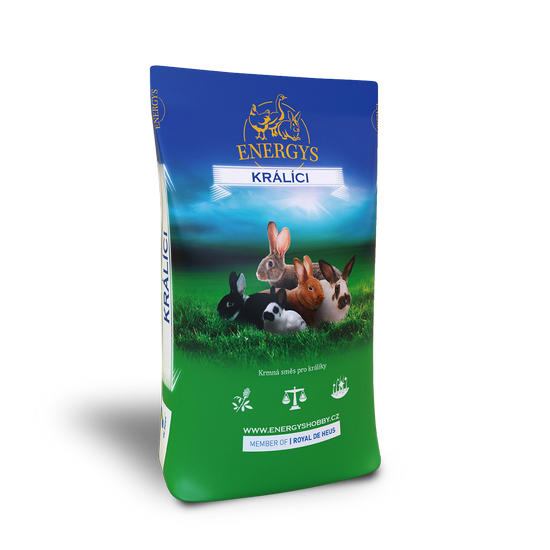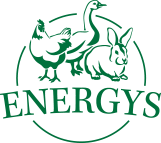Rabbits
Poultry
Laying hens
Quails
Guinea pigs
Pigs
Ostriches
Sheep and goats
Pigeons
Pheasants
Forest animals
NUTRITION AND FEEDING OF DWARF RABBITS
Keeping dwarf rabbits as pets is becoming increasingly popular. It does not require a lot of space and is ideal for people who live in smaller homes or apartments. Dwarf rabbits are also very friendly, so it’s no wonder that people are choosing them for this purpose more and more often. As with all animals, proper nutrition is crucial for the dwarf rabbit.
Nutrient requirement
In order to formulate a good feed ration, it is necessary to take into account the need for several essential nutrients, namely protein, fibre, fat, carbohydrates, minerals and vitamins.
Protein: For proper growth, development and function of the body, the feed should contain approximately 12-16% protein. Sources include some types of hay, alfalfa, flax and sunflower seeds and legumes.
Fibre: Fibre is an essential part of a rabbit’s feed ration, as it ensures the proper functioning of the digestive tract. The feed should contain min. 18-20% fibre. The most suitable source is hay. Alfalfa pellets, grass pellets, wheat bran and oats are also sources of this nutrient in feed mixtures.
Fat: Dwarf rabbits are usually prone to becoming overweight, so the amount of fat in the diet should be limited but sufficient. 2-3% is suitable. A good source of fat is flaxseed, which has a positive effect on fur quality.
Carbohydrates: Carbohydrates are one of the main sources of energy for animals. However, as already mentioned, dwarf rabbits have a tendency towards obesity, so the amount of carbohydrates (both starches and sugars) should be limited. The feed mixture for dwarf rabbits should contain max. 5-10% carbohydrates.
Minerals: These nutrients also occur naturally in feed. We always try to ensure an appropriate ratio of calcium to phosphorus in the feed mixtures, which should be 2:1. Calcium and phosphorus are involved in metabolism and affect the healthy development of teeth and bones. Other important minerals for dwarf rabbits are zinc and magnesium, which affect the quality of the skin and fur. Zinc deficiency can cause fur loss or skin problems.
Vitamins: It is advisable to include vitamin A in the feed ration to support vision, vitamin D for bone health and vitamin E, which is typical for its antioxidant properties. These vitamins in appropriate amounts are usually already included in feed mixtures.
Water
The water should always be clean and safe. The daily water requirement for a dwarf rabbit is approximately 100 ml/1 kg live weight of rabbit. Water is also found in higher quantities in fresh vegetables or green fodder (fresh grass).
Feed
As already mentioned, hay should always be the basis of a dwarf rabbit’s diet. Hay should represent 70-80% of the rabbit’s feed ration. Succulent feeds such as green fodder can also be offered in smaller amounts. In addition to hay, rabbits can also be given, for example, grass pellets or feed mixtures. The feed mixture should always be intended specifically for dwarf rabbits and dosed at a daily amount of about 30-60 grams per kilogram of live weight. It is advisable to divide the feed ration into two sub-rations to prevent “overfeeding”. Dwarf rabbits can also be given various treats, but always in moderation due to the risk of obesity. Dried vegetables or various herbal treats are suitable. On the other hand, fruit is a less suitable source of treats as it contains high amounts of sugars.
Of course, it is always important to monitor the overall condition of dwarf rabbits when feeding them and, if necessary, adjust the feed ration to their individual needs.
Related posts
10. April 2024
Keeping dwarf rabbits as pets is becoming increasingly popular. It does not require a lot of space and is ideal for people who live in smaller homes or apartments. Dwarf rabbits are also very friendly, so it’s no wonder that people are choosing them for this purpose more and more often. As with all animals,…
30. August 2022
In this article we will discuss several rabbit diseases – ear scab, tyzzer’s disease and heat stress.
24. August 2022
In this article we look at two diseases – e.Coli and enterocolitis.
2. August 2022
In this article we look at two common rabbit diseases, myxomatosis and infectious rhinitis.
13. July 2022
In the following article we will discuss rabbit plague – rhd or vhd (viral haemorrhagic disease of rabbits).
Related products

RABBIT DWART
Complete pelleted feed for dwarf rabbits with high digestibility. It contains a high proportion of fibre (high alfalfa and grass cake content) and a reduced sugar and starch content. Contains flaxseed, which has a positive effect on coat quality. Suitable for daily feeding. We recommend providing rabbits with safe fresh water and hay.

RABBIT CHAMPION
Feed for show rabbits, does not include Coccidiostat. A unique mix significantly supports the quality and growth of fur. Serve when moulting and at least two months before the start of the show season.

RABBIT GOLD FORTE
A premium feed mix in an ideal make up for gestating and breast feeding females. For the intensive fattening of rabbits for a period of up to 5 days before slaughter. It supports fast growth, meat content and an excellent state of health. It contains a coccidiostat which lowers the risk of mortality.

RABBIT KLASIK FORTE
Intended for the fattening of rabbits up to a point at least 5 days before slaughter. Suitable for attaining a high meat content and an excellent state of health. Thanks to its Coccidiostat content it lowers the animals mortality.

RABBIT KLASIK
For the final phase of rabbit fattening, a minimum of 5 days before slaughter. It supports high meat content and excellent taste qualities in rabbit meat. Without a coccidiostat.

RABBIT START
For young rabbits from the start of accepting feed to 4-6 weeks after weaning. The feed helps to significantly lower the death rate in the period around weaning. It contains a raised percentage of fibre and less starch. It does not contain a coccidiostat.
